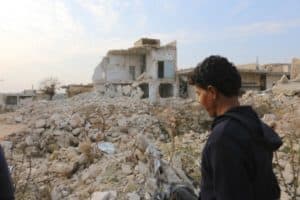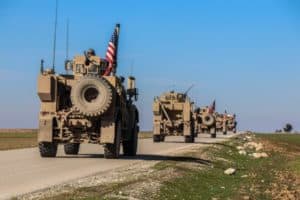This page contains affiliate links. This means if you a follow a link and make a purchase, at no additional cost to you, Humanitarian Careers will receive a commission. Thank you for supporting the site.
Nurses working in humanitarian aid deliver vital medical assistance to people affected by disasters and conflict. Working as a humanitarian nurse is rewarding and challenging, as well as an amazing way to use your medical skills to help those in need. However, there are many routes to work in humanitarian aid and nursing, so what is the best way to become a humanitarian nurse?
To become a humanitarian nurse, you firstly need to be qualified as a medical nurse in your home country. You then need to do additional qualifications to specialise in humanitarian nursing. After this, you should apply for jobs or short-term missions with NGOs focused on providing medical aid.
The humanitarian industry needs qualified medical staff, including nurses, to work on their projects all over the world delivering vital medical relief. Working as a humanitarian nurse gives you unique work experience as well as a chance to practice nursing on the frontline of world emergencies.
Humanitarian Nurse Qualifications
If you want to work as a humanitarian nurse you need to get the right qualifications. Firstly, you need to be a qualified nurse. In most countries this means doing a university degree or specialised course to become a registered nurse. You will also need to get some years’ experience as a nurse working in your home country before being able to do humanitarian work.
Humanitarian NGOs need nurses with formal qualifications and some years’ experience because being a nurse working as part of an international aid programme can be highly demanding and difficult work.
Once you have your formal nursing qualifications and a few years’ experience, to become a humanitarian nurse you should then do some relevant courses to prepare yourself for humanitarian work.
There are many relevant courses in humanitarian health provided by aid organisations. You can either join humanitarian nursing courses run by NGOs, universities or online. To become a humanitarian nurse, you should combine your formal nursing qualifications with some training in humanitarian health.
Humanitarian Health Online Courses
If you are interested in working as a humanitarian nurse, Emory University offers an online course on Health in Complex Humanitarian Emergencies. We think it’s the best short course providing an overview of the key concepts of humanitarian health. Follow the link to the course’s page.
We also highly recommend the University of Copenhagen’s online short course in Non-Communicable Diseases in Humanitarian Settings. Only taking around 15 hours to complete, we think it’s a great addition to the CV of anyone applying for humanitarian nursing roles. Click the link to find out more.
Another great online course for those looking to become humanitarian nurses is the Manchester University course Global Health and Humanitarianism. It takes a wider approach and looks at how humanitarian aid can address public health issues. The link is to the course’s page.
Humanitarian Nursing Organizations
Now that you have gained your nursing qualifications, as well as completed some relevant aid courses, to become a humanitarian nurse you should apply to the right organisations. Many international aid NGOs work responding to health crises.
Humanitarian organisations conducting medical work that recruit humanitarian nurses usually fall into two groups. The first are NGOs providing emergency medical aid to people affected by conflict, displacement or disasters. The second are aid agencies that run longer-term health programmes tackling issues such as HIV/AIDs or on sexual and reproductive health (SRH).
When applying to work as a nurse in humanitarian aid you should decide which type of humanitarian organisations is best for you. Firstly, aid NGOs running emergency responses often take nurses on shorter missions. The advantage of this is that you can often keep your nursing job in your home country, or sign-up to a nursing agency, between doing shorter trips for humanitarian work. Examples of organisations that take humanitarian nurses like this include Médecins San Frontier (MSF) – Doctors without Borders and UK-Med.
If you want to become a humanitarian nurse and do longer term jobs, on projects to improve health outcomes for people affected by chronic crises or poverty, you should apply to humanitarian organisations that focus on health development. Examples of organisations like this can be Medecins du Monde (MdM) – Doctors of the World, and Save the Children. When aiming to work as nurse in humanitarian aid, research the aid organisations and their projects to see what is best suited your qualifications and work ambitions.
Humanitarian Nurse Roles
Nurses working in humanitarian aid can take on several different roles within health projects. Humanitarian nurses can work as registered nurses (RN) in field hospitals, as well as emergency room and ICU nurses.
Other roles for humanitarian nurses include working on vaccination campaigns, conducting health assessments, training local nurses and working with local health authorities. When aiming to become a humanitarian nurse you should consider your qualifications and expertise when deciding what role to take.
Alongside directly giving medical assistance to people in need, humanitarian nurses can also work in programme management roles. Humanitarian aid projects need medically qualified staff, including nurses, to oversee the set-up, implementation and coordination of health projects. These roles, often know as Medical Coordinator or Health Programme Manager, involve managing the medical team, planning health assistance delivery, controlling the budget and working to get the logistics needed in place.
Often nurses working in humanitarian action begin as staff delivering medical assistance and then progress into management roles.
As well as practicing and management nursing roles, for nurses working in humanitarian aid there are also roles focusing on specific issues. For example, humanitarian nurses can work on projects improving maternity outcomes or working with children affected by disasters. There are also roles focusing on gender-based violence (GBV) as well as mental health and psycho-social support (MHPSS).
There are also humanitarian nursing roles relating to sexual and reproductive health (SRH) as well as palliative care. When becoming a humanitarian nurse, aid agencies have a wide variety of roles they need qualified medical nurses for.
Humanitarian Nurse Missions
Humanitarian missions for nurses are often short-term deployments, usually to emergency responses. Humanitarian nurses who take on medical missions often keep their nursing jobs in their home countries, or work for a nursing agency. Humanitarian missions for nurses are often to urgent conflict and disaster zones. The work can be very challenging as medical facilities in these places can be damaged or in poor condition. It can also be difficult to get all the medical supplies needed. However, doing humanitarian nursing missions is an amazing experience and fantastic way to provide medical aid.
To join humanitarian missions as a nurse you usually sign-up for a deployment roster of an aid NGO. Applying to the roster does not guarantee you a humanitarian nursing mission, but being on the register means you are ready to travel urgently into disaster zones.
The emergency roster allows humanitarian organisations to keep qualified and trained staff ready for when disasters happen. Most large medical NGOs such as Medecins Sans Frontier (MSF) – Doctors Without Borders and International Medical Corps (IMC) maintain deployment roster for humanitarian nurses

Humanitarian Nurse Jobs
If you are looking to take on humanitarian work as a nurse longer-term, then you should apply for nursing jobs in international NGOs. Taking on a job as a humanitarian nurse allows you to work on a project for sometimes several months or a year. Nursing jobs in humanitarian aid are often on programmes responding to larger and more endemic health crises such as treating diseases like malaria or HIV/Aids.
Nursing jobs in humanitarian aid can also focus on building local capacity in health, for example by training national nursing staff, helping to improve clinics and hospital management or working with health authorities. These humanitarian nursing jobs allow you to have a longer-term impact with your nursing skills.
Jobs for humanitarian nurses can be applied for either directly on the NGOs website or through job boards such as reliefweb.int. Humanitarian organisations recruiting nurses for jobs include Médecins Du Monde (MdM)-Doctors of the World, International Medical Corp, Save the Children, World Vision and the United Nations World Health Organisation (WHO).
To become a humanitarian nurse, applying for these jobs in the field will give you a chance to provide medical assistance to some of the poorest in the world as well as work to make significant health improvements around the globe.
If you want to learn more about the how to become a humanitarian nurse, check-out our list of the top humanitarian health online courses here.





